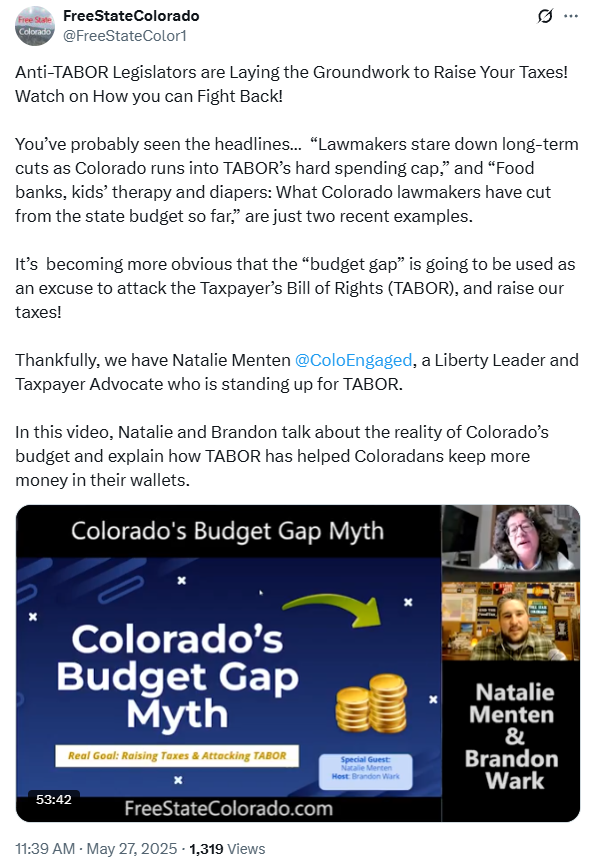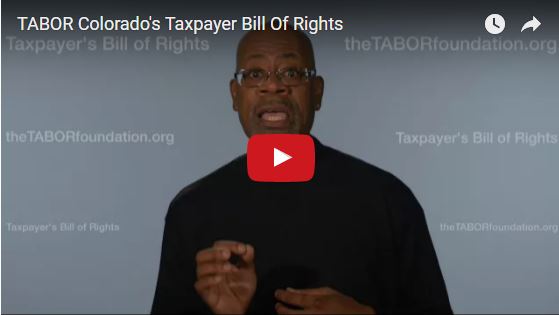
Category Archives: TABOR Refunds
The 2025 Special Session Better NOT Be A TABOR Money Grab
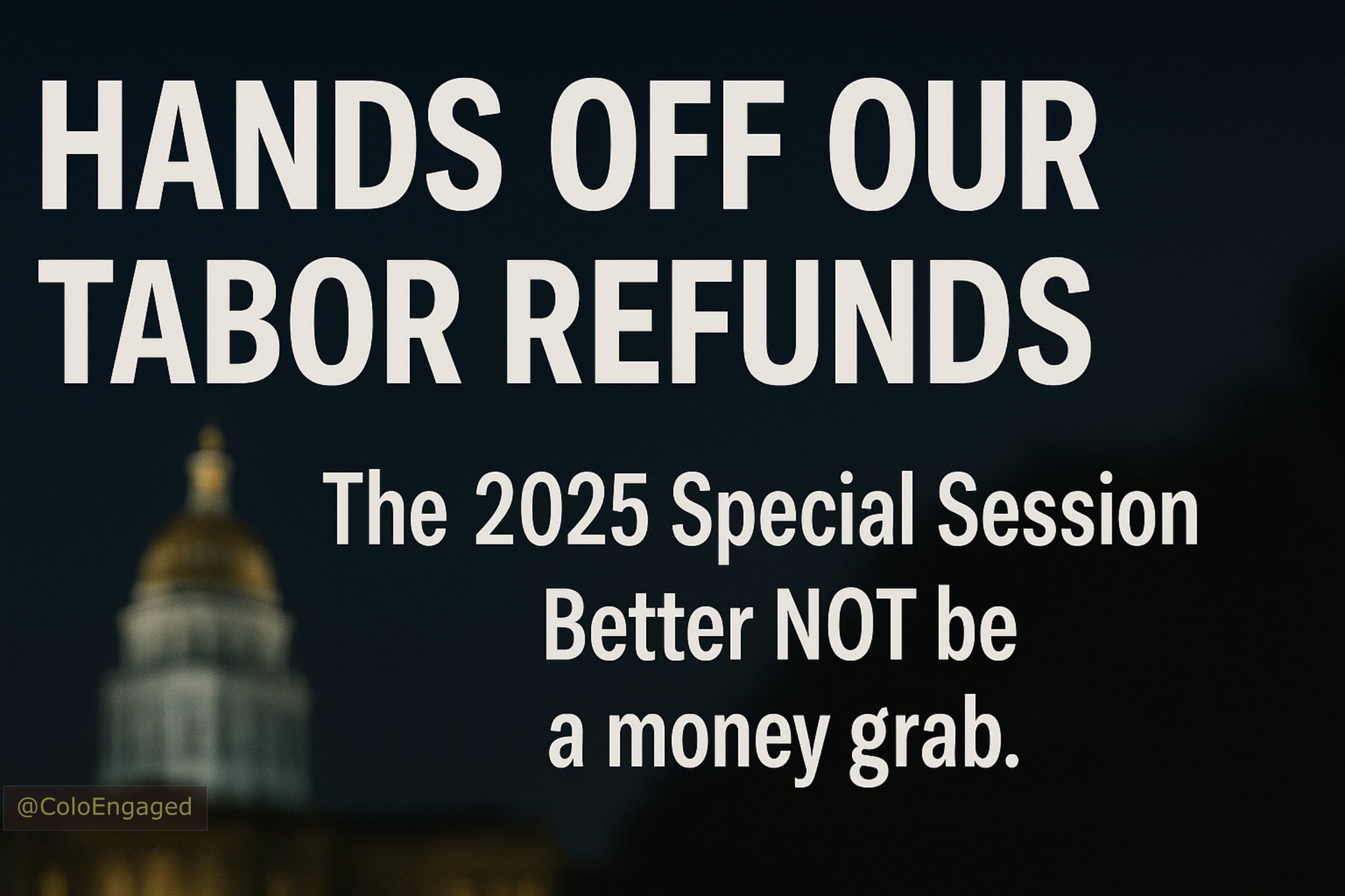
Step Up. Speak Out. Defend TABOR.
Featured

The TABOR Foundation is looking to revive its’ speaker’s bureau. Many of you will remember that we tried, with mixed results, to establish a speakers’ bureau to provide speakers for interested groups around the Denver metro area and across the state. The goal, of course, is to educate people about the value of The Taxpayer’s Bill of Rights in limiting the state’s ability to tax its citizens.
In our past efforts to make the speakers’ bureau work, we had our ducks in a row—for the most part. We have developed a PowerPoint presentation and have a laptop computer dedicated to that presentation. We acquired a digital projector and a screen specifically for our speakers. We also were able to tap into expert help with our messaging and for polishing our presenters’ skills.
So, where’s the weak link? Clearly, it’s in getting speaking engagements scheduled. Doing so requires someone willing to make calls to groups that are looking for speakers for their (usually monthly) meetings. To this point, we have had one person who committed to making calls to schedule speakers.
Let’s be honest. There’s some tedium involved in scheduling these engagements. The scheduler will typically need to contact the person in the organization who is responsible for the group’s programs. There’s phone tag. Or, you get to speak to the correct person only to find out that someone else has taken over the responsibility, and you’ll need to speak to him.
On the positive side, we plan to start approaching friendly groups—other like-minded organizations where members would be most receptive to our message. Conversations tend to be easy. Callers would likely find their calls to be well received. It may take some patience to find a meeting time that matches our speaker’s schedule—a bit more tedium—but the person on the other end of the line will probably be helpful and cooperative.
Here’s the part where we want to improve on past efforts. We’d like to find two volunteers who would commit to scheduling two speaking engagements per month. Perhaps better still would be to find four callers, each of whom would commit to scheduling one engagement per month. Assuming we can find multiple callers, we should probably plan on regular (monthly?) discussions to talk about how things are going and to address challenges people may be having. I guess the bottom line is that we need volunteers who care about limited government and who want to contribute to the effort to rein in government excesses.
We’re asking for your help. If you would be able to commit maybe a couple of hours per month to schedule engagements for us, I’d very much like to talk to you. Or, if you might know of someone who would be willing to take on this role, I’d like to speak to you with the hope that you would make an introduction.
Bob Foland
Executive Director, The TABOR Foundation
TheTABORfoundation@gmail.com
Info@TheTABORcommittee.com
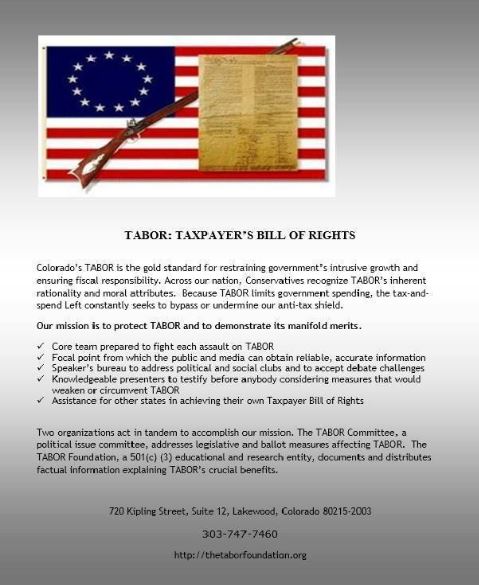

AFP-CO Launches TABOR Campaign Urging Coloradans to Contact Lawmakers
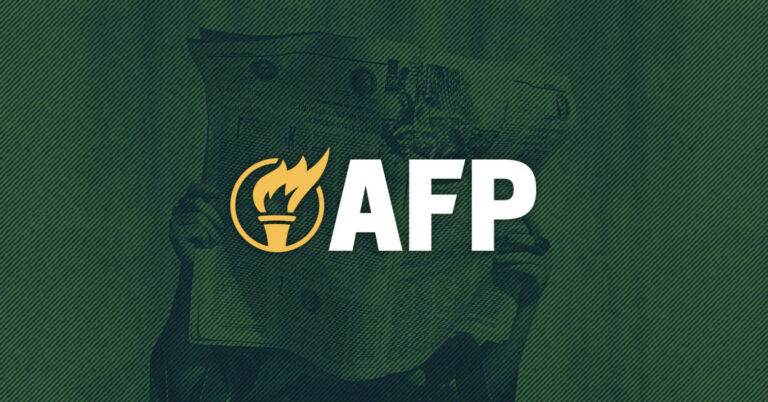
AFP-CO Launches TABOR Campaign Urging Coloradans to Contact Lawmakers
DENVER, CO — Today, Americans for Prosperity-Colorado (AFP-Colorado) announced the launch of a statewide campaign targeting lawmakers who voted to in favor of repealing Colorado’s Taxpayer’s Bill of Rights (TABOR). The campaign also highlights and thanks lawmakers who voted to protect taxpayers and the Taxpayer’s Bill of Rights by opposing House Joint Resolution (HJR) 25-1023.
TABOR has been saving Coloradans more of their hard-earned money for three decades by requiring voters to approve tax increases. More than 70% of Coloradans support TABOR, yet year after year, Democrat lawmakers in Denver dream up new ways to gut it.
To continue reading the rest of this TABOR story, click (HERE) to go to the AFP website.
It’s Worse: Local Governments use Taxpayer Money to Lobby Legislature for TABOR Repeal, Raise Taxes!
Local Governments want to raise your taxes.
Thankfully, we have the Taxpayer’s Bill of Rights (TABOR) that prevents them from taking more of your money without voter approval.
Of course, Politicians and Bureaucrats have been working for years to subvert TABOR.
This year, Democrats in the State Legislature have sponsored a Resolution to initiate a lawsuit (paid for by taxpayers) to repeal our Taxpayer’s Bill of Rights.
And to make matters worse, local governments have been using their taxpayer-funded resources to lobby the Legislature in favor of this TABOR Repeal Lawsuit!
And as Natalie Menten explains in our video, we also have non-profit organizations (some of which have received taxpayer money) also lobbying in favor of repealing TABOR!
It’s wrong on so many levels!
Taxpayers and voters need to stand up and speak out against this blatant attempt to overturn the will of the people and attack our citizen initiative process!
Natalie also provides an update on the TABOR Repeal Lawsuit Resolution and shares video she took at the State Capitol during the Committee Hearing.
Links from Video:
Bob Marshall statement during testimony: https://www.youtube.com/watch?v=WsfSsvMGllk
Require General Assembly TABOR Constitutionality Lawsuit HJR25-1023: https://leg.colorado.gov/bills/hjr25-1023
Colorado Secretary of State Lobbyist Search: https://www.sos.state.co.us/lobby/SearchSubject.do

Get on the Free State Col
Colorado’s TABOR Under Attack from Greedy Legislators! They Want More of Our Money!
Coloradans voted to protect themselves from government overreach in 1992 with the passage of the Taxpayer’s Bill of Rights (TABOR).
Since then, greedy politicians have been trying to repeal TABOR, and raise our taxes to unlimited levels.
Thankfully, they haven’t been able to remove TABOR from our State Constitution.
But these sneaky politicians have found ways to skirt TABOR by increasing fees instead of taxes, and legislative schemes to steal more of our money.
Cory Gaines joined me to discuss this year’s legislation designed to subvert TABOR and grow government beyond what is constitutionally allowed.
Links:
HJR25-1023: Require General Assembly TABOR Constitutionality Lawsuit: https://leg.colorado.gov/bills/hjr25-1023
SB25-173: Revenue Classification Taxpayers Bill of Rights: https://leg.colorado.gov/bills/sb25-173
Information on State Enterprises: https://leg.colorado.gov/publications/state-government-enterprises-1
Brandon Wark & Natalie Menten Discuss The Reality Of Colorado’s Budget
What is TABOR: The Taxpayer’s Bill of Rights? – Advance Colorado Rundown
Advance Colorado Executive Vice President Kristi Burton Brown gives a brief history and explanation of Colorado’s unique taxpayer protection: the Taxpayer’s Bill of Rights. This revenue cap limits the state government’s ability to spend taxpayer dollars and requires refunds to be sent to Coloradans when the government collects beyond the limit.
Hands Off Our TABOR Refunds!
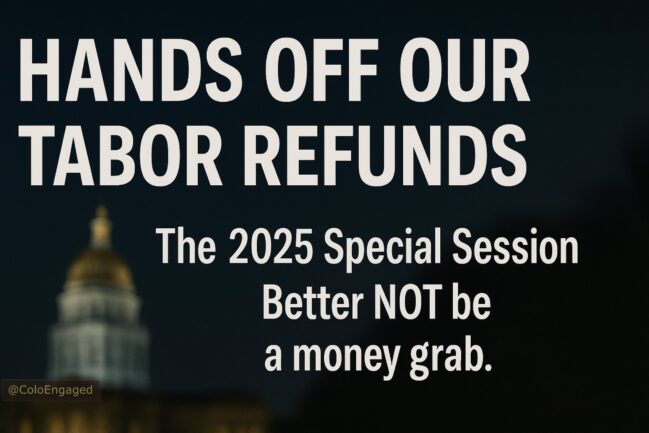
#HandsOffTABOR
#DontBeFooled
#ItsYourMoneyNotTheirs
#TABOR
#FollowTheLaw
#FeesAreTaxes
#VoteOnFees
#ReplaceThemAllForNotFollowingVotersWishes
Good Morning! The Democrats Won’t Be Suing Us Today To Overturn TABOR

